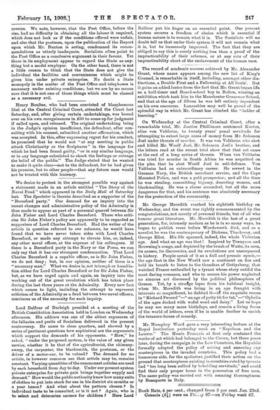Mr. George Meredith reached his eightieth birthday on Wednesday, and
the event was rightly commemorated by the congratulations, not merely of personal friends, but of all who honour great literature. Mr. Meredith is the last of a great generation, for, intensely modern as he is in so many ways, he began to publish verse before Wordsworth died, and as a novelist he was the contemporary of Dickens, Thackeray, and George Eliot. His life spanned, indeed, the whole Victorian age. And what an age was that ! Inspired by Tennyson and Browning's songs, and depicted by the brush of Watts, its men, its causes, its discoveries, and its revolutions are unsurpassed in history. People speak of it as a dull and prosaic epoch,— the age that in the New World saw a continent on fire and held its breath to listen to the thunders of Gettysburg, that watched France enthralled by a tyrant whose story outdid the most daring romance, and who to secure his power neglected no sinuous art discussed by the political philosophers of Greece. Yet, by a straxfge lapse from his habitual insight, when Mr. Meredith was living in an age fraught with interests so magnificent, he dubbed it—bt the exquisite verses in "Richard Feverel "—" an age of petty tit for tat,"—" Ophelia of the ages decked with wofnl weed and daisy." Let us hope he may see many more birthdays, and remain a living focus of the world of letters, even if he is unable further to enrich the treasure-house of comedy.




































 Previous page
Previous page